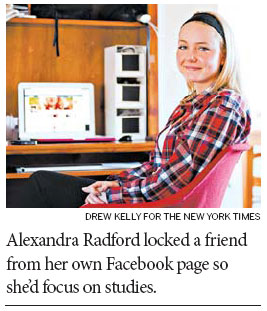Sharing a password opens a risky door
Updated: 2012-02-12 07:52
By Matt Richtel(The New York Times)
|
|||||||
In the digital era it has become fashionable for young people to express their affection by sharing their passwords to e-mail, Facebook and other accounts. Boyfriends and girlfriends sometimes even create identical passwords, and let each other read their private e-mails and texts.
They say they know such digital entanglements are risky, because a souring relationship can lead to people using online secrets against each other. But that, they say, is part of what makes the symbolism of the shared password so powerful.
"It's a sign of trust," Tiffany Carandang, a high school senior in San Francisco, said of the decision she and her boyfriend made to share passwords for e-mail and Facebook. "I have nothing to hide from him, and he has nothing to hide from me."
"That is so cute," said Cherry Ng, 16, listening to her friend's comments. "They really trust each other."
Ms. Carandang, 17, said, "I know he'd never do anything to hurt my reputation."

Changing a password is simple, but students, counselors and parents say that damage is often done before a password is changed, or that the online sharing can be the reason a relationship falters.
The stories of fallout include a spurned boyfriend who tries to humiliate his ex-girlfriend by spreading her e-mail secrets; tensions between couples over scouring each other's private messages for clues of disloyalty or infidelity; or grabbing a cellphone from a former best friend, unlocking it with a password and sending threatening texts to someone else.
Rosalind Wiseman, who studies how teenagers use technology, said the sharing of passwords, and the pressure to do so, was somewhat similar to sex.
Sharing passwords, she noted, feels forbidden because it is generally discouraged by adults and involves vulnerability.
"The response is the same: if we're in a relationship, you have to give me anything," Ms. Wiseman said.
In a 2011 telephone survey, the Pew Internet and American Life Project found that 30 percent of teenagers who were regularly online had shared a password. The survey, of 770 teenagers ages 12 to 17, found that girls were almost twice as likely as boys to share. And in more than two dozen interviews, parents, students and counselors said that the practice had become widespread.
In a recent column on the tech-news Web site Gizmodo, Sam Biddle offered advice to couples and friends on how to avoid missteps.
"I've known plenty of couples who have shared passwords, and not a single one has not regretted it," he said in an interview.
Students say there are reasons beyond a show of trust to swap online keys. For instance, several college students said they shared Facebook passwords to force themselves to study for finals. A student would give her password to a friend to change it - and not disclose the new one - thereby temporarily locking out the account holder and taking away a big distraction to studying.
Alexandra Radford, 20, a junior at San Francisco State University, said one friend wanted to know the new password before exams ended, but Ms. Radford held firm.
"Once finals were over, I gave it to her," she said. But Ms. Radford is more sheepish about the passwords she had shared in high school with her boyfriend.
"We did it so I could check his messages because I didn't trust him, which is not healthy," she conceded.
Counselors typically advise against the practice, and parents often preach the wisdom of password privacy. Winifred Lender, a child psychologist in Santa Barbara, had her three sons sign "digital contracts" that outline terms for how much media they will consume, how they will behave online and that they will not share passwords.
Patti Cole, 48, a child psychologist, said she thinks young people are sometimes drawn to such behavior as they might be toward sex, in part because parents and others warn them against doing so.
"What worries me is we haven't done a very good job at stopping kids from having sex," she said. "So I'm not real confident about how much we can change this behavior."
The New York Times
(China Daily 02/12/2012 page11)